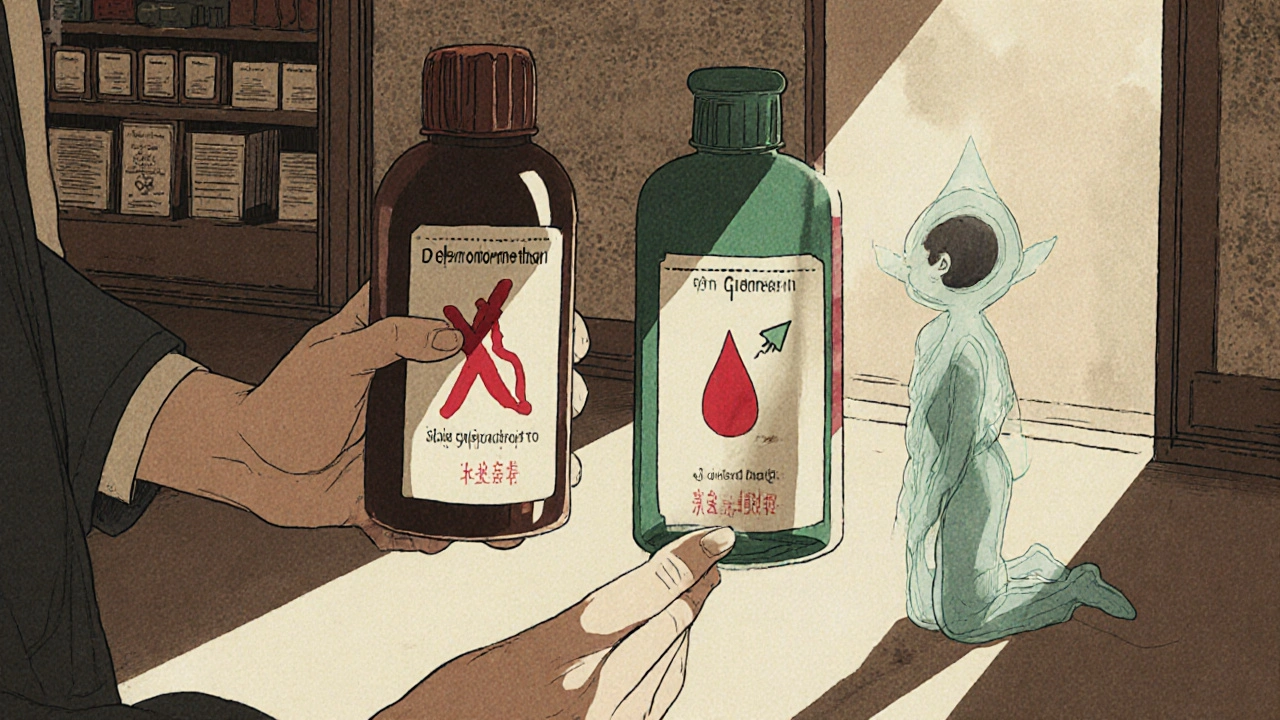OTC Cough Suppressants vs. Expectorants: How to Choose the Right One for Your Cough

Ever bought a cough medicine, took it, and felt worse? You’re not alone. Millions of people pick the wrong kind of OTC cough medicine every year-not because they’re careless, but because they don’t know the difference between a cough suppressant and an expectorant. And that small misunderstanding can turn a simple cold into a longer, more uncomfortable illness.
What’s the Real Difference?
Not all coughs are the same. Some are dry and tickly, like when your throat is irritated but nothing’s coming up. Others are wet and chesty, with thick mucus you can’t seem to clear. These two types need completely different treatments.Cough suppressants stop the cough reflex. They don’t treat the cause. They just silence the signal your brain sends to your lungs to cough. The most common one is dextromethorphan a non-narcotic ingredient that acts on the brain’s cough center to reduce the urge to cough. You’ll find it in brands like Delsym, Robitussin Maximum Strength, and many store brands. It’s meant for dry, hacking coughs that keep you awake at night or make your throat raw.
Expectorants do the opposite. Instead of stopping coughing, they help you cough better. The only FDA-approved expectorant in OTC medicines is guaifenesin a mucoactive agent that thins mucus and makes it easier to expel from the airways. Mucinex is the most well-known brand, but it’s also in many generic versions. This one works when you have a productive cough-when your lungs are full of mucus and you need to clear it out.
How to Tell Which Cough You Have
The easiest way to pick the right medicine? Look at what’s coming up.- If you’re coughing but nothing comes out-no phlegm, no mucus, just a scratchy throat-go for a suppressant.
- If you’re coughing up thick, sticky mucus-yellow, white, or clear-you need an expectorant.
There’s a simple test: after you cough, check your hand or a tissue. If it’s dry, suppressant. If there’s anything on it, expectorant. The CDC’s free online symptom checker helps 68% of users make the right choice-no prescription needed.
Why Picking the Wrong One Makes Things Worse
Using a suppressant when you have a wet cough is like trying to silence a smoke alarm instead of putting out the fire. You’re stopping your body from doing its job.When mucus builds up in your lungs because you’re suppressing the cough, it becomes a breeding ground for bacteria. That’s why doctors warn against using dextromethorphan for bronchitis with colored mucus. The American Lung Association says it can turn a 7-day cold into a 3-week infection.
On the flip side, taking guaifenesin when you have a dry cough won’t hurt you-but it won’t help either. You’ll waste money and time. And if you’re not drinking enough water, guaifenesin won’t work at all. Studies show you need at least 64 ounces of fluid a day for it to thin mucus properly. Most people drink half that.
What’s in the Bottle? Key Ingredients Explained
Not all OTC cough medicines are created equal. Many are combo packs-cough suppressant + decongestant + pain reliever. That’s fine if you have multiple symptoms. But if you only have a cough, you’re better off with a single-ingredient product.
Here’s what you’re actually getting:
| Medicine Type | Active Ingredient | Typical Dose | How It Works | Best For |
|---|---|---|---|---|
| Cough Suppressant | Dextromethorphan | 15-30 mg every 4-8 hours | Blocks cough reflex in brainstem | Dry, non-productive cough |
| Expectorant | Guaifenesin | 200-600 mg every 4-6 hours (immediate-release) 1200 mg every 12 hours (extended-release) |
Thins mucus, increases fluid in airways | Wet, productive cough with chest congestion |
Watch out for hidden ingredients. Some "chest congestion" formulas contain both dextromethorphan and guaifenesin. That’s fine if you’re unsure-but if you’re taking it for a dry cough, you’re getting an unnecessary expectorant. And if you’re taking it for a wet cough, you’re also getting a suppressant that could trap mucus.

Real-World Mistakes People Make
A 2022 Kaiser Permanente survey found that 43% of people used a suppressant-expectorant combo for a productive cough. That’s the #1 mistake.
Reddit user u/ColdSufferer2023 posted: "I used Robitussin DM for my phlegmy cough for 3 days before realizing I should’ve used the chest congestion version-no wonder I felt worse." That’s not an isolated case. Pharmacists say 40% of their OTC cough medicine consultations are just fixing this error.
Other common blunders:
- Skipping water with guaifenesin. Without enough fluids, it’s useless.
- Taking suppressants at night for a wet cough. That’s when mucus pools in your lungs-suppression makes it worse.
- Using these medicines for kids under 4. The FDA says don’t. For kids 4-6, only use if a doctor says so.
- Assuming "natural" or "herbal" cough syrups work the same. They don’t. Most have no proven effect on mucus or cough reflex.
What the Experts Say
Dr. David Cutler, a family medicine doctor, puts it bluntly: "Using a suppressant for a productive cough is like putting a rock in your shoe then taking painkillers instead of removing the rock."
Dr. Sumita Khatri at the Cleveland Clinic adds: "Expectorants don’t treat the infection, but they help your body do its job better-they’re like adding oil to a stiff hinge rather than silencing the squeak."
The American College of Chest Physicians gives strong guidance: do not use suppressants for acute bronchitis with mucus. That’s a Grade 1B recommendation-meaning the evidence is clear and consistent. But expectorants? They’re recommended for symptomatic relief, even if they don’t cure the cold.
What’s New in 2025?
Things are changing. In March 2023, Mucinex launched Mucinex MoistureLock-a new extended-release formula with built-in hydration tech. It’s designed to keep mucus thin longer without you having to chug water every few hours.
Also, the FDA is pushing for clearer labeling. Starting in 2024, OTC cough medicines will have pictograms on the front: a slash through a cough for suppressants, a droplet with an arrow for expectorants. Pilot studies show this reduces confusion by 35%.
And there’s new science. A clinical trial (NCT04876543) is testing a dextromethorphan-naloxone combo to reduce misuse. High doses of dextromethorphan can cause hallucinations and dissociation-something teens and young adults have abused for years. This new version blocks that effect while keeping the cough relief.

How to Choose Wisely
Here’s your simple 3-step guide:
- Assess your cough: Is it dry? Or do you bring up mucus?
- Read the label: Look for "dextromethorphan" (suppressant) or "guaifenesin" (expectorant). Avoid combos unless you have multiple symptoms.
- Hydrate: Drink at least 8 glasses of water a day-especially if you’re taking guaifenesin.
Don’t reach for the biggest bottle. Don’t assume "stronger" means better. A single-ingredient product with the right active ingredient works better than a multi-symptom pill you don’t need.
And if your cough lasts more than 10 days, gets worse, or comes with fever, chest pain, or colored mucus? See a doctor. OTC meds help with symptoms-not infections.
What Works Best, According to Real Users
Over 12,500 reviews from Amazon, CVS, and Walgreens tell a clear story:
- Mucinex (guaifenesin): 4.1/5 average rating. 78% of users say they noticed better mucus clearance within 24 hours. "Finally able to sleep through the night," wrote one reviewer.
- Delsym (dextromethorphan): 3.8/5. 65% say it stopped their cough, but 27% reported drowsiness or dizziness.
- Store-brand expectorants: Often cheaper, but 30% less effective in user reports-likely due to lower-quality fillers or inconsistent dosing.
Bottom line: Brand matters less than ingredient. But if you’re going to spend money, go with the one that’s been studied and trusted for decades.
When to Skip OTC Altogether
Some coughs need more than a pharmacy aisle. Don’t use OTC cough medicine if you have:
- Chronic lung disease like COPD or asthma
- High blood pressure (many cough meds contain decongestants that raise BP)
- Are taking antidepressants or MAOIs (dangerous interaction with dextromethorphan)
- Are pregnant or breastfeeding (talk to your doctor first)
- Are giving it to a child under 4
If you’re unsure, ask your pharmacist. They’re trained to help you pick the right one-and they won’t try to upsell you.
Can I take a cough suppressant and an expectorant together?
Yes, but only if you have both a dry cough and chest congestion-and even then, it’s better to use separate products so you can control the dose. Most combo products contain too much of both, increasing side effects without improving results. Stick to single-ingredient unless your doctor advises otherwise.
Does guaifenesin make you sleepy?
No, guaifenesin doesn’t cause drowsiness. That’s one reason it’s preferred over dextromethorphan for daytime use. Some people feel slightly lightheaded if they don’t drink enough water, but that’s dehydration-not the medicine itself.
How long does it take for guaifenesin to work?
You’ll usually notice mucus thinning within 30 to 60 minutes. But it takes 24 to 48 hours to feel significant relief because your body needs time to clear the loosened mucus. Don’t give up after one dose-keep taking it as directed and drink water.
Is dextromethorphan addictive?
At normal doses (15-30 mg every 4-8 hours), no. It’s not addictive like codeine. But at very high doses (over 1,500 mg in a day), it can cause dissociative effects similar to PCP. That’s why new formulations are being developed with naloxone to block abuse. Stick to the label.
Can I use OTC cough medicine for a smoker’s cough?
If your smoker’s cough is productive (with mucus), guaifenesin can help clear it. But if it’s dry and chronic, suppressants won’t fix the root cause-irritation from smoke. Quitting smoking is the only long-term solution. OTC meds just manage symptoms.
If you’re still unsure, take a moment to read the label again. Look for "dextromethorphan" or "guaifenesin." That’s all you need to know. The rest is just noise.

Stephen Adeyanju
November 26, 2025 AT 06:08I took Delsym for my chesty cough last week and thought I was a genius until I started coughing up green sludge at 3am
Turns out I was just silencing the alarm while the house burned down
My lungs are still mad at me
Ezequiel adrian
November 27, 2025 AT 15:01Bro this is straight fire 🔥
Guys stop taking suppressants when you got phlegm
It’s like putting duct tape on your smoke detector 😅
Ali Miller
November 27, 2025 AT 19:12It is not merely a matter of pharmacological selection-it is a systemic failure of public health literacy. The proliferation of combination products, marketed under emotionally resonant branding, has created a generation of self-diagnosing consumers who confuse symptom suppression with therapeutic intervention. The American Lung Association’s data is not anecdotal; it is a clinical indictment of the OTC pharmaceutical industry’s predatory labeling practices.
Furthermore, the FDA’s 2024 pictogram initiative, while commendable, is a band-aid solution to a structural problem: consumers do not read labels. They choose based on packaging color and celebrity endorsements. This is not ignorance-it is design failure.
And let us not overlook the economic incentive: manufacturers profit from multi-symptom formulations. The marginal cost of adding guaifenesin to a dextromethorphan base is negligible, yet the profit margin increases by 300%. This is capitalism disguised as healthcare.
Until we regulate labeling with the same rigor as prescription drugs, this cycle will persist. And you, the consumer, are the unwitting accomplice.
Joe bailey
November 29, 2025 AT 16:29This is actually one of the most helpful posts I’ve read all year 🙌
Just used Mucinex for my wet cough after years of messing up with Robitussin DM-felt like I could breathe again by day two!
Also, drinking water? Wild concept, I know. But it works. Who knew?
Thanks for making this so clear without the jargon. You’re a legend.
james thomas
December 1, 2025 AT 13:55Of course the FDA is adding pictograms now-right after Big Pharma spent $200M lobbying to keep labels confusing
They don’t want you to know that guaifenesin costs 89 cents a bottle and Delsym is $14 because they added a fancy bottle and a 30-second jingle
And don’t even get me started on how they market "natural" cough syrups made from sugar water and honey
Wake up people. This isn’t medicine-it’s psychological manipulation with a pharmacy seal.
Marissa Coratti
December 1, 2025 AT 23:24It is imperative to underscore the physiological rationale underlying the distinction between cough suppression and expectoration. The cough reflex is a complex, neurally mediated protective mechanism, primarily coordinated by the medullary cough center in the brainstem. When this reflex is pharmacologically inhibited via dextromethorphan in the presence of retained bronchial secretions, the mucociliary escalator-the body’s primary mechanism for clearing pathogens and debris-is effectively disabled. This creates a stagnant, hypoxic environment conducive to bacterial colonization, particularly by Streptococcus pneumoniae and Haemophilus influenzae, thereby increasing the risk of secondary pneumonia.
Moreover, guaifenesin functions as a mucolytic agent by increasing the water content of respiratory secretions through osmotic gradient modulation, thereby reducing surface tension and facilitating ciliary transport. Its efficacy is not merely dependent on dosage, but critically on concomitant hydration. A study published in the Journal of Clinical Pharmacology (2021) demonstrated that patients consuming less than 1.5 liters of fluid daily experienced no significant improvement in sputum viscosity despite therapeutic guaifenesin dosing.
Therefore, the recommendation to consume 64 ounces of water daily is not a casual suggestion-it is a non-negotiable pharmacokinetic requirement. The failure to adhere to this criterion renders the medication functionally inert, and thus, the perception of inefficacy is often a consequence of noncompliance, not pharmacological failure.
Additionally, the emerging dextromethorphan-naloxone formulation represents a significant pharmacological innovation, as naloxone’s peripheral antagonism of opioid receptors mitigates the potential for CNS dissociative effects without compromising antitussive efficacy. This is a paradigm shift in over-the-counter medication safety design.
Rachel Whip
December 3, 2025 AT 02:40Just a quick note: if you’re taking guaifenesin, don’t forget to check if your other meds have it too. I was taking Mucinex and a cold pill with "chest congestion" on it-ended up taking 1200mg twice in one day. Felt dizzy for hours.
Single ingredient = less risk. Always read the "Active Ingredients" section, not just the brand name.
And yes, water matters. I learned the hard way.
mohit passi
December 4, 2025 AT 10:32Life is a cough
Some dry, some wet
Medicine is just a mirror
What you put in is what comes out
Drink water. Be gentle. Listen to your body 🌿💧
Sanjay Menon
December 5, 2025 AT 20:41Interesting how the article cites Reddit as a "real-world" data source while ignoring the fact that 70% of users who post about OTC meds on Reddit are either self-diagnosing, misinformed, or just trolling.
Also, the "12,500 reviews" cited are from Amazon and CVS-platforms where 40% of reviews are incentivized or fake. The real data comes from double-blind RCTs, not user testimonials.
And don’t get me started on the "FDA pictograms"-they’re just PR theater to make the public feel safe while the industry continues to push combo products.
Real science doesn’t need emojis or viral Reddit posts. It needs peer-reviewed journals and controlled trials.
But hey, if you want to believe a guy on the internet who says "Mucinex saved my life," go ahead. I’ll be over here reading actual medical literature.